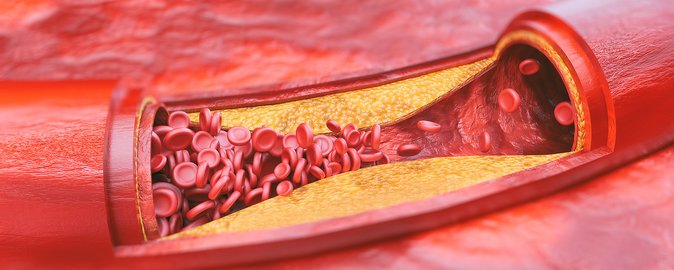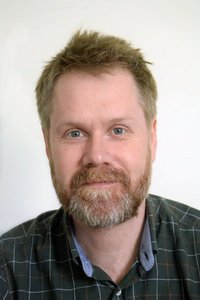- Education
-
Research
Current research
Talent
-
Collaboration
Businesses
Government agencies and institutions
Alumni
-
About AU
Organisation
Job at AU
Professor Jacob Fog Bentzon from Aarhus University and the Spanish National Cardiovascular Research Centre receives DKK 15 million from the European Research Council for a ground-breaking research project on atherosclerosis – one of the most frequent causes of death in the world.
2019.12.10 |

Research has shown that atherosclerosis in mice is driven by very few smooth muscle cells that have a massive cell division. In the coming research Professor Jacob Fog Bentzon will try to uncover whether the same is true in humans and whether we can affect the altered vascular smooth muscle cells in a way that makes the disease better. Illustration of atherosclerosis by Shutterstock.

Ultimately, the goal is to find new ways of treating late atherosclerosis in humans, Jacob Fog Bentzon says about his DKK 15 million research project.
Although atherosclerosis is one of the most common diseases in the world, researchers studying it still have much work to do to uncover and understand exactly what happens when fat and cholesterol are deposited in the arteries, leading to arteriosclerosis and the risk of blood clots in the heart and the brain.
They have only recently discovered that many of the cells seen in atherosclerosis are in reality what are known as vascular smooth muscle cells which alter their appearance and function. A research group led by professor of experimental atherosclerosis Jacob Fog Bentzon, will now work to uncover the significance of these mysterious cells.
The professor has just received a Consolidator Grant of DKK 15 million from the European Research Council towards a five-year research project in Aarhus and Madrid.
"When you look at atherosclerosis in the microscope, what you see is a complex disease with many types of cells. But we now know that although the cells may look different, the majority of them originate from the arteries’ own vascular smooth muscle cells,” says Jacob Fog Bentzon, who divides his time as professor between the Department of Clinical Medicine (Cardiology) at Aarhus University and the Spanish cardiovascular research centre CNIC in Madrid. He is also affiliated with the Steno Diabetes Center Aarhus.
"The background for the project is our discovery that atherosclerosis in mice is driven by very few of these vascular smooth muscle cells that alter their function and proliferate massively. In our coming research we will try to uncover whether the same is true in humans and – very importantly – whether we can affect the altered vascular smooth muscle cells in a way that ameliorates the disease," says Jacob Fog Bentzon.
“Ultimately, the goal is to find new ways of treating late atherosclerosis in humans. And the path to doing this is paved with a wide range of studies in genetically modified mice and pigs," he adds.
The DKK 15 million will, among other things, be used to bring together a team of young researchers who, like Jacob Fog Bentzon, will move between Aarhus and Madrid and in this way utilise the research facilities in both locations – all in the spirit of the EU funding.
Grants from the European Research Council are given for free and independent research that has the potential to lead to ground-breaking discoveries. The Consolidator Grant which Jacob Fog Bentzon has received is for researchers with 7-12 years of experience since the completion of their PhD.
Jacob Fog Bentzon
Aarhus University, Department of Clinical Medicine
Email: jfbentzon@clin.au.dk
Mobile: (+45) 9352 1562